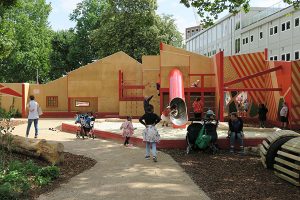In today’s society, the importance of creating inclusive and safe play spaces for children cannot be overstated. In particular, it is crucial to ensure that girls have access to engaging, empowering and inclusive play environments. By fostering a welcoming atmosphere that encourages girls to explore, learn, and develop new skills, we can empower them to thrive both on and off the playground. In this article, we will delve into the significance of creating welcoming play spaces for girls, exploring the benefits, design considerations, safety measures, and community involvement that contribute to their success.
Recognising the importance of inclusive play spaces:
Play is not only a source of enjoyment but also a vital component of a child’s social, emotional, and cognitive development. However, gender stereotypes and biases often restrict girls’ play experiences, limiting their opportunities for growth and exploration. Creating welcoming play spaces provides girls with an environment free from these constraints, enabling them to express themselves freely and embrace their individual interests and abilities.
As stated in our previous blog The Positive Effects For Mental Health That A Playground Can Bring a playground offer a multitude of ways to boost mental health whether it be through letting off steam, overcoming challenges or creating a safe space to meet friends. Creating a playground needs to ensure that all are welcome and able to continue to enhance happy and secure minds.
Playgrounds as inclusive and empowering environments:
Thoughtful playground design plays a significant role in fostering girls’ engagement and enjoyment. By incorporating elements such as swings, benches, and monkey bars, we can create a well-rounded play space that caters to girls’ diverse interests and promotes inclusivity.
Swings: Swings offer a timeless play experience that can be enjoyed by children of all ages and genders. By including swings in the play space, we provide girls with the opportunity to experience the joy of soaring through the air, enhancing their sense of freedom and physical coordination.
Benches: Including benches strategically throughout the play area encourages social interaction and creates spaces for girls to rest, observe, and engage in imaginative play. Benches serve as gathering spots for friendships to flourish and provide a sense of inclusivity by inviting girls to connect with one another.
Monkey Bars: Monkey bars offer an exhilarating challenge that promotes upper body strength, coordination, and problem-solving skills. By incorporating monkey bars into the play space, we encourage girls to push their boundaries, build confidence, and develop resilience.
By offering a diverse range of play equipment, including swings, benches, and monkey bars, we ensure that girls have ample opportunities for exploration, physical activity, and skill development. It is essential to choose gender-neutral and non-stereotypical designs for these elements, allowing girls to feel included and empowered in their play experiences.
Ensuring safe play spaces for girls:
Safety is of utmost importance when creating welcoming play spaces for girls. Adhering to safety measures and standards, such as age-appropriate equipment and soft surfacing, minimises the risk of injuries. Additionally, providing adequate supervision and implementing secure environments allows girls to explore confidently, boosting their self-assurance and sense of independence. Lighting of a playground is something that we are seeing more and more of playgrounds. A well lit space we feel more secure as well as allowing the space to be used all year round.
Fostering social connections through play:
Play spaces serve as platforms for social interaction and collaboration among children. By fostering an inclusive environment that breaks down social barriers, we can promote positive social connections among girls. Inclusive activities and games that encourage collaboration, teamwork, and problem-solving can help girls develop valuable social skills, empathy, and cooperation.
Engaging the community in creating welcoming play spaces:
Creating welcoming play spaces for girls requires collaboration among various stakeholders, including community organisations, schools, and parents. By involving the community in the design and implementation process, we can ensure that the play spaces truly meet the needs and preferences of the girls they serve. Successful initiatives and partnerships that promote girls’ participation provide inspiration and guidance for other communities looking to embark on similar endeavours.
 Company Make Space for Girls quote that ‘It’s essential that ideas from the gender mainstreaming movement are brought into the decision making, design and planning process in the UK out of a need for equality, and to enable girls and
Company Make Space for Girls quote that ‘It’s essential that ideas from the gender mainstreaming movement are brought into the decision making, design and planning process in the UK out of a need for equality, and to enable girls and
young women to take part in public space.’
Numerous organisations and communities have already implemented inclusive play spaces for girls, setting examples for others to follow. These initiatives often involve innovative approaches, design elements, and strategies that foster inclusivity and empowerment. By examining these case studies and success stories, we can gain valuable insights into how welcoming play spaces positively impact girls’ physical, social, and cognitive development.
Embracing the power of welcoming play spaces for girls:
By providing girls with welcoming play spaces, we equip them with the tools they need to thrive. They learn to assert themselves, challenge stereotypes, and embrace their unique abilities and interests. Moreover, these play spaces become platforms for social connection, where girls can build friendships, develop empathy, and cultivate essential social skills. It is our collective responsibility to advocate for and contribute to the creation of these inclusive spaces in our communities.
Remember, a well-designed playground with inclusive features not only accommodates girls’ interests but also provides a platform for them to challenge gender stereotypes and thrive in their playtime. Let us continue to design play spaces that embrace the diverse needs and aspirations of all children, fostering a sense of belonging and empowerment.



